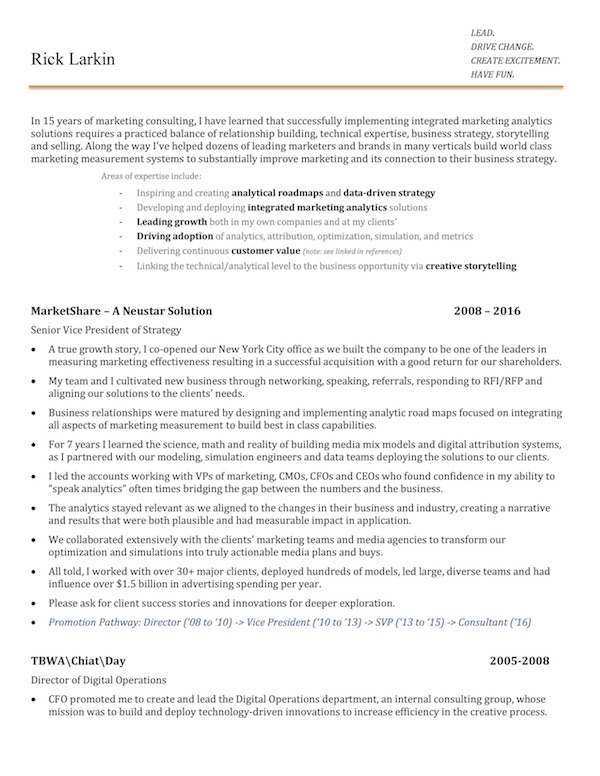This guest post by Erica Seidel is part of a regular column she writes, Ask the Martech Recruiter. Erica runs The Connective Good, a retained executive recruiting firm that helps companies land leaders in martech, marketing, digital strategy, analytics, and market research.
Dear Erica,
I’m interviewing a candidate for our brand-new head of marketing technology next week. What should I ask in the interview?
Thanks,
Bob, New York
Hi, Bob.
Thanks for writing. I love collecting good interview questions for all kinds of marketers. And for this one, I’ve crowdsourced some help from several of my martech pals.
Here’s a Martech Interview Guide for you.
Martech Interview Guide: Martech Strategy
- How do you determine the health of a martech stack?
- How do you make sure a martech stack aligns with business strategy?
- How do you sustain innovation of the martech stack on a regular basis?
- How do you balance delivering short term business objectives with making long term strategic capability investments?
- How do you balance experimenting with new technologies versus investing in better adoption/value from technologies that you already have?
- Can you tell me a story about how you’ve used an existing technology in your stack to solve a new business challenge?
- Single-vendor integrated stack or best-of-breed stack – what’s your recommendation and why?
- Here’s our marketing funnel [draw it, showing the number of leads at each stage.] How would you improve it? [Listen for how the person structures the response and what questions they pose.]
- Consider these three situations: Implement technologies from scratch, inherit and improve technologies, or rip and replace technologies. Which do you have the most experience with? Least experience with? Which do you enjoy the most and why?
- Here are our business objectives, budget, martech stack, and login credentials. Please log in and play around with the tools for as long as you’d like. Then let us know what you would start, stop, and continue as the head of marketing technology. [Note that this exercise fits less into a typical interview framework and more into an assessment. You may choose to pay high-potential candidates for their time to do this.]
- Please craft a martech lifecycle management strategy. As part of this, define the stages, the entry/exit points for each stage, and performance indicators. Here’s our current tech stack info, business objectives, hypothetical budget, and talent available. Please present on your strategy and one-year plan. [This is another assessment that goes beyond a typical interview framework but can be very revealing. The best strategies will likely include a fiscal plan, people-enablement plan, change management plan (integrations, training, documentation, etc.), and objective-based outcome measures/indicators (did this tech do what the business needed at the time the business asked for it). While few strategic plans survive reality, this exercise will help you see whether the candidate’s level of strategic thinking matches what you need. Thank you to the very thoughtful Isaac Wyatt for this doozy of a contribution.]
Martech Interview Guide: Working with Tech & Data
- What are the main data sources you work with? Who owns this data? What are the pros and cons of that ownership model?
- Describe your most significant experience with integrations.
- We’d like to aggregate data across marketing and customer service. How should we approach it?
- Pick something “new” like virtual reality or artificial intelligence. What should we be doing to capitalize on it and why?
- You are going to select and deploy a new CRM provider. Where do you start? [Do they address important factors like features/functionality that are needed, integration with existing tools, and ease of use?]
- How would you go about establishing a 360-degree view of the customer across channels (online and offline) considering many of the walled gardens (Facebook, Google, Amazon, for instance) that exist and continue to pop up?
Martech Interview Guide: Working with Vendors
- How would you ensure you’ve gotten the most from your vendors at the best price?
- Tell me about a time a vendor was not performing. How did you know and how did you respond and what ultimately happened?
- When do you know it is time to move on from a vendor?
Martech Interview Guide: Working with Colleagues
- Have you faced valid disagreement between your marketing and technology colleagues? What was the disagreement? How did you approach it? What was the outcome? What was the fate of your relationships with these peers? What would you do differently in hindsight?
- Do you manage a team now? How is your team structured and why? What do you do yourself versus assign to them? [This helps you see how hands-on the person is.]
- How will you advocate for marketing technology in the organization? What support do you need?
- How do you envision working with sales, in an ideal environment? On a scale of 1 to 10, how is your relationship with sales now? How could it be better?
- When we call someone from sales operations to ask what you were like to work with, what will they say? When we call someone from marketing, what will they say? When we talk with someone from IT, what will they say?
- The CEO rushes in claiming that the company needs a new email services provider. How do you respond?
Martech Interview Guide: Impact
- Tell me about the KPIs you pay attention to, and at what intervals.
- How do you quickly assess whether you’ve made the best martech investments?
- How do you want to be measured in this role?
- How are you distinct from other marketing technologists?
- What is the financial impact you’ve had on your current company?
- How will you learn what you need to learn in this role? Design your learning agenda. [See whether the person prioritizes staying in the know on new tools, and linking technology choices to business needs.]
Some caveats for you
Of course, you’ll want to evaluate other things that are not martech-specific, so consider this guide a start to a well-rounded assessment.
In my experience, an interview with mediocre questions but excellent listening and probing is better than an interview with great questions but poor listening. Having good questions to ask is a great start, but you also need to know in advance what you are listening for. What is the range of responses and what is a good response for your situation? And what else are you learning when you listen “between the lines?”
A huge thank you to the following martech and marketing pros who contributed to this piece: Ben Auld, James Gardner, Mark Goloboy, Will Gonzalez, Shawn Goodin, Vivek Kumar, Christopher Penn, Kelly Phillips, John Refford, Jason Seeba, Justin Sharaf, Marc Simony, Isaac Wyatt and Christopher Yu.
Have a question on recruiting or career transitions to propose for this column? Please email erica@theconnectivegood.com. Don’t worry, we’ll keep your name and company confidential.
Readers — vote for your favorite question(s) in the comments below.
Readers: Erica is on the board of advisors of the MarTech conference. She will be leading an executive session at our upcoming event San Francisco, May 9-11, with a panel of CMOs: How Chief Marketers From Visa, Belkin, and Oracle Are Transforming Their Teams and Talent. Register today for the lowest “alpha” rate on tickets to guarantee your seat.



